|
|
|
Sort Order |
|
|
|
Items / Page
|
|
|
|
|
|
|
| Srl | Item |
| 1 |
ID:
033249
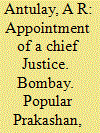

|
|
|
|
|
| Publication |
Bombay, Popular Prakashan, 1973.
|
| Description |
ix, 243p.
|
|
|
|
|
|
|
|
|
|
|
|
Copies: C:1/I:0,R:0,Q:0
Circulation
| Accession# | Call# | Current Location | Status | Policy | Location |
| 012173 | 347.0350954/ANT 012173 | Main | On Shelf | General | |
|
|
|
|
| 2 |
ID:
117493
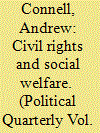

|
|
|
|
|
| Publication |
2012.
|
| Summary/Abstract |
This article draws on T H Marshall's celebrated classification of civil, political and social rights to examine the use of the courts by individuals seeking to establish rights to particular forms or models of welfare service provision. It argues that tensions between the collective and individual aspects of social rights, the relationship of social rights to inequality, and the difficulty of quantifying (and therefore enforcing) legitimate expectations, all make the use of litigation to establish social rights intensely problematic. Drawing on the recent UK Supreme Court case of R (on the Application of McDonald) v Royal Borough of Kensington and Chelsea, it goes on to suggest that it is unhelpful to think of social rights in terms of human rights: instead, we would do better to adopt Marshall's emphasis on the citizenship basis of social rights and on the social and political context within which they necessarily exist.
|
|
|
|
|
|
|
|
|
|
|
|
|
|
|
|
| 3 |
ID:
140201
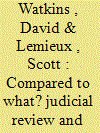

|
|
|
|
|
| Summary/Abstract |
Many democratic and jurisprudential theorists have too often uncritically accepted Alexander Bickel's notion of “the countermajoritarian difficulty” when considering the relationship between judicial review and democracy; this is the case for arguments both for and against judicial review. This framework is both theoretically and empirically unsustainable. Democracy is not wholly synonymous with majoritarianism, and judicial review is not inherently countermajoritarian in the first place. In modern democratic political systems, judicial review is one of many potential veto points. Since all modern democratic political systems contain veto points, the relevant and unexplored question is what qualities might make a veto point relatively democratic. Proceeding on the assumption that democracy's primary normative value is found in its opposition to domination by both state and private actors, we make a preliminary effort to delineate what qualities a democratic veto point might have, identifying five criteria, and evaluate judicial review using these criteria. We conclude that judicial review's performance against these criteria is decidedly mixed, but in the final balance is likely to be a modest net positive for democracy, particularly when compared to other veto points commonly found in contemporary democratic political systems.
|
|
|
|
|
|
|
|
|
|
|
|
|
|
|
|
| 4 |
ID:
100846
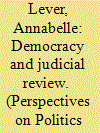

|
|
|
|
|
| Publication |
2009.
|
| Summary/Abstract |
This article shows that judicial review has a democratic justification, although it is not necessary for democratic government and its virtues are controversial and often speculative. Against critics like Waldron and Bellamy, it shows that judges, no less than legislators, can embody democratic forms of representation, accountability and participation. Hence, judicial review is not undemocratic simply because it enables unelected judges to over-rule elected legislators when people disagree about rights. Against recent defenders of judicial review, such as Eisgruber and Brettschneider, it shows that democratic arguments for judicial review do not require judges to be better at protecting rights than legislators. Hence a democratic justification for judicial review does not depend on complex and inevitably controversial interpretations and evaluations of judicial as opposed to legislative judgments. Democratic government does not demand special virtue, competence or wisdom in its citizens or their leaders. From a democratic perspective, therefore, the case for judicial review is that it enables individuals to vindicate their rights against government in ways that parallel those they commonly use against each other. This makes judicial review normatively attractive whether or not it leads to better decisions than would be made by other means.
|
|
|
|
|
|
|
|
|
|
|
|
|
|
|
|
| 5 |
ID:
118081


|
|
|
| 6 |
ID:
111509


|
|
|
|
|
| Publication |
2012.
|
| Summary/Abstract |
This article deals with the judicialization of politics in Pakistan under the Supreme Court Chief Justice Choudhry (2009-). Confrontation between the executive and judiciary under him led to speculation about the imminent collapse of the democratic system, given the history of military take-over in the country. The use of judicial review, whereby the Court exercised the power of interpreting the Constitution with impunity, was widely criticized as an attempt to encroach on the territory of the legislature through case law. At the institutional level, the Court sought to exercise veto power over the appointment of judges and to deny the right of oversight to any government agency. The Court's pursuit of public interest litigation through frequent suo motu actions taken in a populist mode led to brinkmanship on the part of the executive and judiciary. Despite this power play, the Court's operations fell into the category of modus operandi, instead of being a fight to the finish. However, the Court's pursuit of judicial reform relating to cheap and speedy justice and accountability of the higher judiciary remained far from satisfactory.
|
|
|
|
|
|
|
|
|
|
|
|
|
|
|
|
| 7 |
ID:
099144
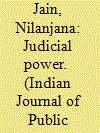

|
|
|
| 8 |
ID:
126349
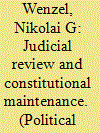

|
|
|
|
|
| Publication |
2013.
|
| Summary/Abstract |
Constitutional restraints on government are tricky and evanescent; government failure (a lapse into anarchy or leviathan) has historically been the norm, and constitutional success an infrequent exception. To shed light on constitutional maintenance, this article examines the concept of constitutional review by studying three competing systems: the American/Marshall system of judicial review; the Commonwealth/Westminster model of parliamentary sovereignty; and the Kelsen compromise between the two. Each system's strengths and weaknesses are assessed, as constitutional framers navigate the treacherous waters between the Scylla of parliamentary tyranny and Charybdis of gouvernement des juges. In the end, neither extreme is perfect, but lessons are drawn from each of the three models.
|
|
|
|
|
|
|
|
|
|
|
|
|
|
|
|
| 9 |
ID:
146105
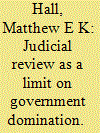

|
|
|
|
|
| Summary/Abstract |
For centuries, politicians, activists, and academics have criticized the American system of judicial review as democratically illegitimate. In response, dozens of scholars have striven to justify the institution’s place in a democratic political system. A compelling justification for judicial review must provide a realistic description of its function and a normatively attractive understanding of that function. Unfortunately, the most prominent justifications suffer from empirical or theoretical problems. However, recent empirical evidence suggests an “acquittal theory” that meets both criteria. On this view, courts armed with judicial review can thwart majority will by relieving individuals from government sanctions, but they lack the power to independently impose sanctions. This asymmetry suggests a resolution to the countermajoritarian difficulty that does not rely on judicial wisdom or behavior: the nature of judicial power ensures that judicial review reliably promotes a core democratic value—freedom from government domination—without seriously threatening other democratic values.
|
|
|
|
|
|
|
|
|
|
|
|
|
|
|
|
| 10 |
ID:
110536
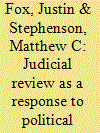

|
|
|
|
|
| Publication |
2011.
|
| Summary/Abstract |
We use an agency model to analyze the impact of judicial review on the incentives of elected leaders to "posture" by enacting bold but ill-advised policies. We find that judicial review may exacerbate posturing by rescuing leaders from the consequences of unwise policies, but may also discourage posturing by alerting voters to unjustified government action. We further find that judges will defer to the decision of elected leaders unless posturing is sufficiently likely. We then show how judicial review affects voter welfare, both through its effect on policy choice and through its effect on the efficacy of the electoral process in selecting leaders. We also analyze how the desirability of judicial review is affected by characteristics of the leaders and the judges.
|
|
|
|
|
|
|
|
|
|
|
|
|
|
|
|
| 11 |
ID:
166096
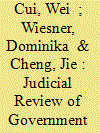

|
|
|
|
|
| Summary/Abstract |
The judicial review of government actions is often used as a bellwether of the government’s attitude towards the rule of law in China. Accordingly, in gauging the direction of legal reform in the Xi era, media reports have highlighted changes in litigation against government agencies as evidence of positive movement towards greater rule of law. We provide a selective review of changes in China’s administrative litigation system in the last few years, giving special attention to the amendment in 2014 of the Administrative Litigation Law (ALL), and a 2018 Supreme People’s Court Interpretation of the same statute. In our view, the question of whether lawsuits might be brought against the government has arguably been superseded in importance by the question of how courts will decide such lawsuits. And the generic notion of judicial independence itself no longer sheds sufficient light on actual and possible judicial responses. Using the purportedly expanded scope of review of informal policy directives as an example, we show that symbolism-motivated advocacy to improve the administrative litigation in China may come at the expense of protecting the non-symbolic functions of judicial review, e.g., the coherence of law and consistency in the delivery of justice.
|
|
|
|
|
|
|
|
|
|
|
|
|
|
|
|
| 12 |
ID:
129609
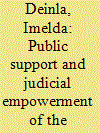

|
|
|
|
|
| Publication |
2014.
|
| Summary/Abstract |
Courts have become an increasing focus for political contestation in Southeast Asia. Yet little is known about the basis of their political power and legitimacy. Drawing on recent scholarship in the field of judicial politics, and presenting a case study of the Philippine Supreme Court after the transition to democracy in 1986, this article explores the conditions under which the Court has exercised its powers in the context of a democratizing state such as the Philippines. More specifically, it will show how strong public support has enabled the Court to exercise its judicial review powers and its authority over contending political actors. In drawing attention to the understudied link between public support and judicial assertiveness, the paper aims to advance existing scholarship by going beyond existing indicators of judicial independence and to provide new insights into the dynamics of evolving constitutional practice in the region through the interaction of the courts with the public.
|
|
|
|
|
|
|
|
|
|
|
|
|
|
|
|
| 13 |
ID:
152859
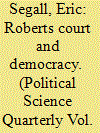

|
|
|
|
|
| Summary/Abstract |
ERIC SEGALL reviews Stephen Gottlieb’s recently published book Unfit for Democracy: The Roberts Court and the Breakdown of American Politics. He agrees with Gottlieb’s argument that the Roberts Court has too often neglected the needs of racial minorities, the poor, and the disenfranchised. Segall suggests that Gottlieb could have made a more persuasive case by setting forth in more detail the conservative positions supporting the Roberts Court decisions.
|
|
|
|
|
|
|
|
|
|
|
|
|
|
|
|
| 14 |
ID:
106258
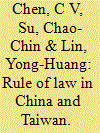

|
|
|
|
|
| Publication |
2011.
|
| Summary/Abstract |
This paper argues that Taiwan and China should sidestep the issue of what constitutes "one China" and instead improve the rule of lawin their respective areas, which could lead to a better system of government. One element of a better system is prosperity, which both sides are quite keen on. But the remaining two components- freedom and democracy- cannot be realized without rule of law. Sun Yat-sen's Three Stages of NationalReconstruction offers a viable framework for the development of the rule of law on the two sides of the Taiwan Strait.
The rule of lawinChina is,with a fewnotable differences, at a similar stage of development as it was in Taiwan under martial law. Such a difference in the two governments' legal development could derail their efforts toward closer ties.
China has to overcome many challenges before it can undertake legal reform; however, there is reason to believe and hope that the development and maturation of its legal system will continue. Discussions centered around "clean and efficient government and corporate governance" would help Taiwan and China take the first of many practical steps to accelerate cross-Strait exchange and relations.
|
|
|
|
|
|
|
|
|
|
|
|
|
|
|
|
| 15 |
ID:
184308
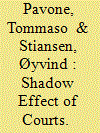

|
|
|
|
|
| Summary/Abstract |
We challenge the prevalent claim that courts can only influence policy by adjudicating disputes. Instead, we theorize the shadow effect of courts: policy makers preemptively altering policies in anticipation of possible judicial review. While American studies imply that preemptive reforms hinge on litigious interest groups pressuring policy makers who support judicial review, we advance a comparative theory that flips these presumptions. In less litigious and more hostile political contexts, policy makers may instead weaponize preemptive reforms to preclude bureaucratic conflicts from triggering judicial oversight and starve courts of the cases they need to build their authority. By allowing some preemptive judicial influence to resist direct judicial interference, recalcitrant policy makers demonstrate that shadow effects are not an unqualified good for courts. We illustrate our theory by tracing how a major welfare reform in Norway was triggered by a conflict within its Ministry of Labor and a government resistance campaign targeting a little-known international court.
|
|
|
|
|
|
|
|
|
|
|
|
|
|
|
|
| 16 |
ID:
080296
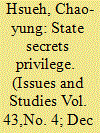

|
|
|
|
|
| Publication |
2007.
|
| Summary/Abstract |
On January 25, 2007, for the first time in Taiwan's history, President Chen
Shui-bian filed a request for a constitutional interpretation and invoked the state
secrets privilege in an attempt to shield the first lady from a corruption trial. The
interpretation sparked a national uproar and many in the media voiced criticism of the
president. The controversy centered on the assertion by the grand justices that the
president enjoys "special privilege over state secrets," and that he alone can decide
what is a state secret. Some argued that this is a "super umbrella" of protection
tailored for the president, which may lead to the creation of a dictatorship and allow a
ruler to cheat the people in the name of "protecting national secrets."
The state secrets privilege has been described as the "nuclear bomb of legal
tactics," which is most often used by the executive branch in civil court cases to
protect against subpoenas, discovery motions, or other judicial requests for
information. Based the application of this privilege in the United States, we find that
state secrets privilege is increasingly subject to abuse and is wrongly used to protect
the executive branch from embarrassment, to hide criminal activity, and to thwart
legal requests for information and close off investigations.
We argue that the state secrets privilege should be treated as qualified, not
absolute. Otherwise there is no adversary process in court and no exercise of
judicial independence over available evidence. The judiciary should take steps to
prevent the state secrets privilege from remaining a license for executive overreaching,
and to prevent injustice from being committed in the name of secrecy
|
|
|
|
|
|
|
|
|
|
|
|
|
|
|
|
|
|
|
|
|